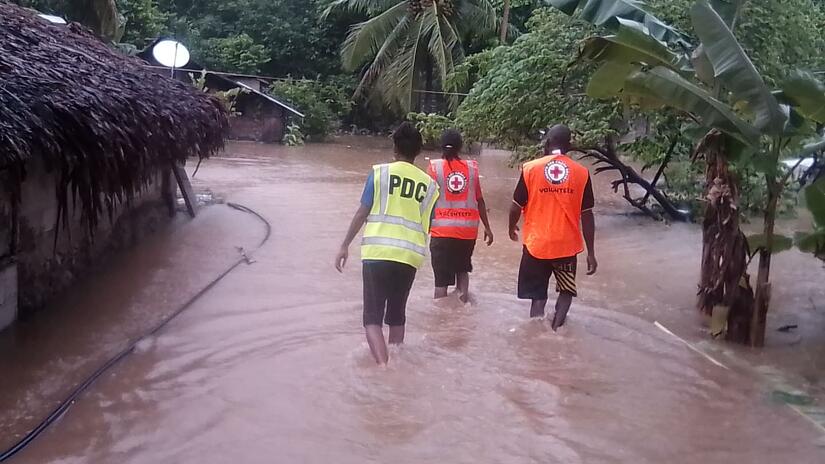Geneva/Kuala Lumpur/Suva, 8 April 2020 – As Cyclone Harold hammers Vanuatu and Fiji, initial reports show extensive damage across both island nations as the storm continues to sweep through the Pacific.
Cyclone Harold hit Vanuatu on Monday night as a powerful category 5 storm - the strongest to hit the country since 2015’s devastating Cyclone Pam - bringing heavy rain, damaging storm surges and winds of up to 235 km/h. It then moved on to Fiji on Wednesday morning as a category 4, forcing more than 1,000 people to take shelter in evacuation centres.
Ms Jacqueline de Gaillande, Vanuatu Red Cross Society Secretary General, says while there have been no reports of fatalities, information is beginning to trickle out.
“It appears that many buildings and crops have been destroyed and some people in the most affected areas have lost everything,” she said. “Our teams have already been out doing assessments where they can, and feel a real responsibility to help as many people as possible.”
Phone networks are still down in many of the worst affected islands in Vanuatu. However, initial reports from Santo’s main town Luganville, where the storm first made landfall on 6 April, suggest that 50 to 70 per cent of buildings in the town were damaged and hundreds of people are sheltering in evacuation centres.
As many as 1,000 trained Vanuatu Red Cross volunteers - 120 of whom are Emergency Response Team members - have been on the ground since Friday, prepositioning essential relief items, and helping communities prepare by sharing life-saving information and helping people get to evacuation centres.
The International Federation of Red Cross and Red Crescent Societies (IFRC) released more than 50,000 Swiss francs (more than 51,500 US dollars) from its Disaster Relief Emergency Fund to support Vanuatu Red Cross’ work, and is ready to provide further support as the full picture of the storm’s impact emerges.
The ongoing work to protect Vanuatu from the COVID-19 pandemic has caused some challenges for teams helping to prepare communities for the cyclone, and may also complicate the response to the disaster.
While Vanuatu currently has no confirmed cases of COVID-19, the country has been in a State of Emergency since 26 March, with border restrictions and a ban on inter-island travel in place to help keep the disease out for as long as possible.
Over the weekend, disaster authorities had to lift bans on public gatherings of more than five people to ensure people made their way to evacuation centres, and further decisions are expected to be made to make sure that affected communities get the support they need as quickly as possible.
“Cyclone Harold will have a big effect on our COVID-19 activities,” Ms de Gaillande said. “We cannot afford to have any confirmed cases in Vanuatu so we must really take care in the coming time.”
Parts of Fiji are still experiencing the worst of Cyclone Harold's impact, with reports of widespread flooding and damage. People living in coastal areas are being warned of powerful storm surges and Fiji Red Cross teams have been helping people move to higher ground.
Photos are available here.
Press release
Red Cross swings into action immediately after Japan earthquake
Red Cross swings into action immediately after Japan earthquake
| Press release

